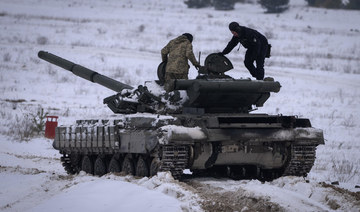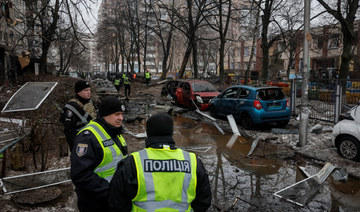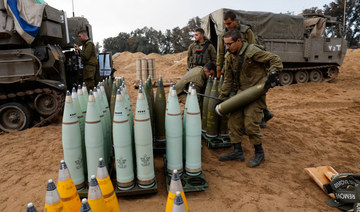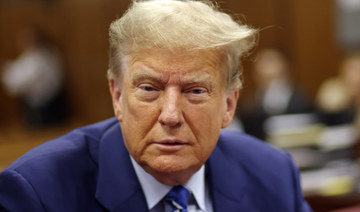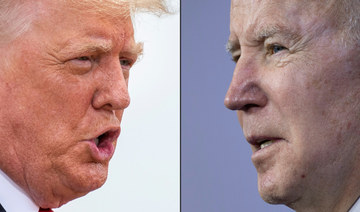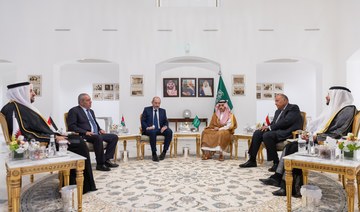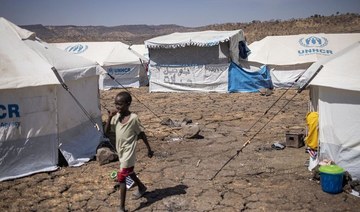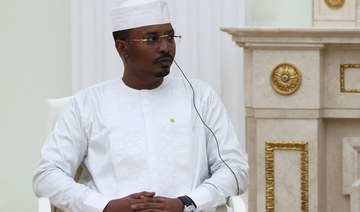KYIV: Russian drones bore down on the city of Kyiv early on Friday, with Mayor Vitali Klitschko and other officials reporting strikes on widely separated residential districts.
It was the sixth drone attack on the capital this month. At least two people were injured.
Klitschko said a drone had hit a block of flats in the Solomyanskyi district, south of the city center, triggering a fire. Two people were injured, including one being treated in hospital.
“The upper floors are in flames. Emergency crews are on site,” Mayor Klitschko said.
A video posted on social media showed a giant orange flame going skyward in the night.
Klitschko also said drone fragments had set fire to a house under construction in Darnytskyi district on the eastern bank of the Dnipro River that runs through the city.
He said there were no injuries. Pictures posted online showed construction materials strewn about the site.
Serhiy Popko, head of Kyiv’s military administration, reported fragments from a downed drone had struck an apartment building in a third area — Holosiivskyi district — also south of the city center.
Popko posted pictures showing smashed windows and heavy damage to apartments.
Mass drone attack hits several districts in Ukrainian capital
https://arab.news/bxyy9
Mass drone attack hits several districts in Ukrainian capital
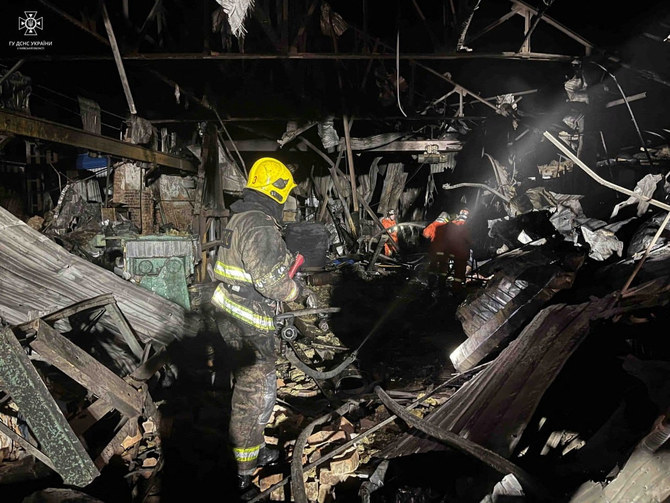
- A drone had hit a block of flats in the Solomyanskyi district, triggering a fire: Mayor Vitali Klitschko
US intel suggests Putin may not have ordered Navalny death in prison: WSJ
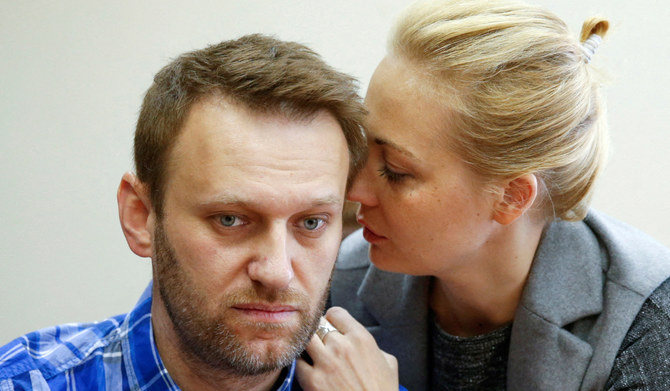
- The Russian prison service said that Navalny collapsed on February 16 after a walk at the isolated camp
WASHINGTON: US intelligence agencies believe that while the Russian president was ultimately responsible for the death of opposition leader Alexei Navalny, he didn’t order it to take place when it did, the Wall Street Journal reported Saturday.
The finding, which the Journal said was based on both classified intelligence and an analysis of public facts, raises new questions about Navalny’s death in a remote Arctic prison camp, which led to a new round of sanctions against President Vladimir Putin’s Russia.
Among those facts was the timing of the opposition leader’s death in mid-February, which overshadowed Putin’s reelection a month later.
While the new finding does not question Putin’s responsibility for Navalny’s death, the CIA and other US intelligence agencies believe he probably didn’t order it “at that moment,” the Journal said, quoting people familiar with the matter.
It said that some European officials, briefed on the US finding, were skeptical that the 47-year-old dissident could have been targeted without Putin’s prior knowledge, given the tight controls in today’s Russia.
President Joe Biden and several other world leaders have publicly expressed little doubt about the matter. “Make no mistake. Putin is responsible for Navalny’s death,” Biden said after the stunning news of the death emerged.
The Russian prison service said that Navalny collapsed on February 16 after a walk at the isolated camp. It said attempts to revive him failed.
Navalny had seemed relatively healthy and in good spirits when seen in a video just a day earlier.
A week before that, he reportedly had been the subject of high-level talks over a potential prisoner swap that could have freed him.
Navalny had been serving a 19-year prison sentence on charges he and his backers insist were fabricated.
He had earlier survived a poisoning that US and other investigators blamed on the Kremlin. Russian officials have denied culpability in the poisoning or in his death.
A number of prominent Kremlin opponents have died, been jailed and or forced into exile in recent years.
Reached by AFP, the National Security Council declined to comment on the report.
Some US officials say in internal memo Israel may be violating international law in Gaza
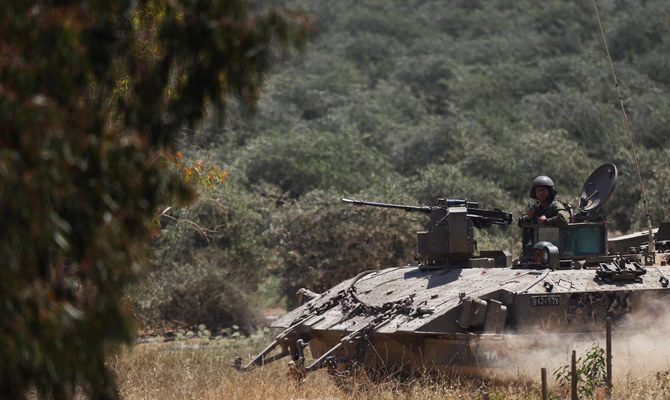
- The submissions to the memo provide the most extensive picture to date of the divisions inside the State Department over whether Israel might be violating international humanitarian law in Gaza
WASHINGTON: Some senior US officials have advised Secretary of State Antony Blinken that they do not find “credible or reliable” Israel’s assurances that it is using US-supplied weapons in accordance with international humanitarian law, according to an internal State Department memo reviewed by Reuters.
Other officials upheld support for Israel’s representation.
Under a National Security Memorandum (NSM) issued by President Joe Biden in February, Blinken must report to Congress by May 8 whether he finds credible Israel’s assurances that its use of US weapons does not violate US or international law.
By March 24, at least seven State Department bureaus had sent in their contributions to an initial “options memo” to Blinken. Parts of the memo, which has not been previously reported, were classified.
The submissions to the memo provide the most extensive picture to date of the divisions inside the State Department over whether Israel might be violating international humanitarian law in Gaza.
“Some components in the department favored accepting Israel’s assurances, some favored rejecting them and some took no position,” a US official said.
A joint submission from four bureaus — Democracy Human Rights & Labor; Population, Refugees and Migration; Global Criminal Justice and International Organization Affairs – raised “serious concern over non-compliance” with international humanitarian law during Israel’s prosecution of the Gaza war.
The assessment from the four bureaus said Israel’s assurances were “neither credible nor reliable.” It cited eight examples of Israeli military actions that the officials said raise “serious questions” about potential violations of international humanitarian law.
These included repeatedly striking protected sites and civilian infrastructure; “unconscionably high levels of civilian harm to military advantage“; taking little action to investigate violations or to hold to account those responsible for significant civilian harm and “killing humanitarian workers and journalists at an unprecedented rate.”
The assessment from the four bureaus also cited 11 instances of Israeli military actions the officials said “arbitrarily restrict humanitarian aid,” including rejecting entire trucks of aid due to a single “dual-use” item, “artificial” limitations on inspections as well as repeated attacks on humanitarian sites that should not be hit.
Another submission to the memo reviewed by Reuters, from the bureau of Political and Military Affairs, which deals with US military assistance and arms transfers, warned Blinken that suspending US weapons would limit Israel’s ability to meet potential threats outside its airspace and require Washington to re-evaluate “all ongoing and future sales to other countries in the region.”
Any suspension of US arms sales would invite “provocations” by Iran and aligned militias, the bureau said in its submission, illustrating the push-and-pull inside the department as it prepares to report to Congress.
The submission did not directly address Israel’s assurances.
Inputs to the memo from the Office of the Special Envoy to Monitor and Combat Antisemitism and US ambassador to Israel Jack Lew said they assessed Israel’s assurances as credible and reliable, a second US official told Reuters.
The State Department’s legal bureau, known as the Office of the Legal Adviser, “did not take a substantive position” on the credibility of Israel’s assurances, a source familiar with the matter said.
State Department spokesperson Matthew Miller said the agency doesn’t comment on leaked documents.
“On complex issues, the Secretary often hears a diverse range of views from within the Department, and he takes all of those views into consideration,” Miller said.
MAY 8 REPORT TO CONGRESS
When asked about the memo, an Israeli official said: “Israel is fully committed to its commitments and their implementation, among them the assurances given to the US government.”
The White House did not respond to a request for comment.
Biden administration officials repeatedly have said they have not found Israel in violation of international law.
Blinken has seen all of the bureau assessments about Israel’s pledges, the second US official said.
Matthew Miller on March 25 said the department received the pledges. However, the State Department is not expected to render its complete assessment of credibility until the May 8 report to Congress.
Further deliberations between the department’s bureaus are underway ahead of the report’s deadline, the US official said.
USAID also provided input to the memo. “The killing of nearly 32,000 people, of which the GOI (Government of Israel) itself assesses roughly two-thirds are civilian, may well amount to a violation of the international humanitarian law requirement,” USAID officials wrote in the submission.
USAID does not comment on leaked documents, a USAID spokesperson said.
The warnings about Israel’s possible breaches of international humanitarian law made by some senior State Department officials come as Israel is vowing to launch a military offensive into Rafah, the southern-most pocket of the Gaza Strip that is home to over a million people displaced by the war, despite repeated warnings from Washington not to do so.
Israel’s military conduct has come under increasing scrutiny as its forces have killed 34,000 Palestinians in Gaza, according to the enclave’s health authorities, most of them women and children.
Israel’s assault was launched in response to the Hamas attack on Israel on Oct. 7, in which Israel says 1,200 people were killed and 250 others taken hostage.
The National Security Memorandum was issued in early February after Democratic lawmakers began questioning whether Israel was abiding by international law.
The memorandum imposed no new legal requirements but asked the State Department to demand written assurances from countries receiving US-funded weapons that they are not violating international humanitarian law or blocking US humanitarian assistance.
It also required the administration to submit an annual report to Congress to assess whether countries are adhering to international law and not impeding the flow of humanitarian aid.
If Israel’s assurances are called into question, Biden would have the option to “remediate” the situation through actions ranging from seeking fresh assurances to suspending further US weapons transfers, according to the memorandum.
Biden can suspend or put conditions on US weapons transfers at any time.
He has so far resisted calls from rights groups, left-leaning Democrats and Arab American groups to do so.
But earlier this month he threatened for the first time to put conditions on the transfer of US weapons to Israel, if it does not take concrete steps to improve the dire humanitarian situation in Gaza.
President Joe Biden says he’s ‘happy to debate’ Donald Trump. Trump says he’s ready to go
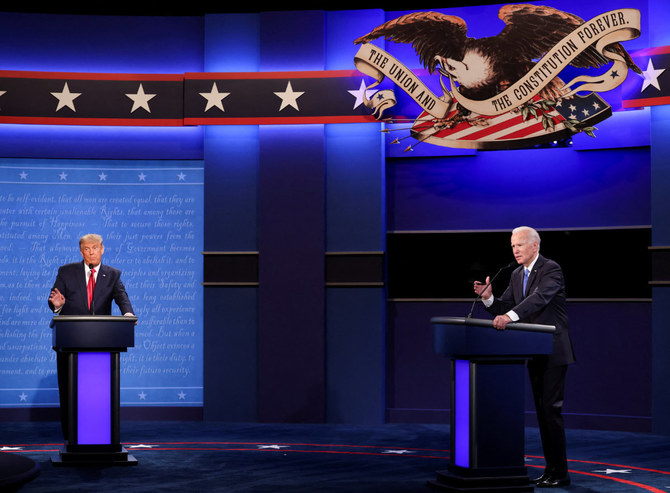
- Biden had previously been vague, saying in March that whether he debated Trump “depends on his behavior”
- During the 2020 general election, Biden was notably irritated by Trump’s antics in the chaotic first debate
NEW YORK: President Joe Biden said Friday that he is willing to debate his presumptive Republican opponent, Donald Trump, later this fall – his most definitive comment yet on the issue.
Trump said he was ready, though he questioned Bidens’s willingness.
Biden’s comment came during an interview with the Sirius XM radio host Howard Stern, who asked him whether he would participate in debates against Trump.
“I am, somewhere. I don’t know when,” Biden said. “But I’m happy to debate him.”
Until now, Biden’s reelection campaign had declined to commit to participating in the debates, a hallmark of every general election presidential campaign since 1976.
Biden himself had also been vague, saying in March that whether he debated Trump “depends on his behavior.” The two men debated twice during the 2020 general election — a campaign year constrained significantly by COVID-19 restrictions — and Biden was notably irritated by Trump’s antics in the chaotic first debate that year.
“Will you shut up?” Biden told Trump at one point during the first debate.
Trump campaign officials have said for some time that the former president is prepared to debate Biden anytime, and Chris LaCivita, Trump campaign senior adviser, quickly responded to Biden’s remarks on the social media site X: “OK let’s set it up!”
Later Friday, Trump reacted to Biden’s new public willingness to debate by saying “everyone knows he doesn’t really mean it” but suggested either next Monday evening, Tuesday evening or Wednesday evening, when Trump will be campaigning in Michigan. The former president is suggesting evenings because he is otherwise attending proceedings for his hush money criminal trial in New York.
Trump is required to be in court every day but Wednesdays. In a statement on his own social media platform, Trump also challenged Biden to debate at the Manhattan courthouse on Friday night, since both men were in New York at the same time. Biden has since returned to Washington.
Yet Friday is also Melania Trump’s birthday, and the former president had already said earlier in the day that he was flying back to Florida to spend the day with his wife once his trial had wrapped for the day.
As Trump left court for the day in New York on Friday afternoon, he repeated his challenge and said: “We’re ready. Just tell me where. I will do it at the White House. That would be very comfortable, actually.”
Trump did not participate in any of the Republican primary debates this cycle.
The Commission on Presidential Debates has already announced the dates and locations for the three general election debates between the presidential candidates: Sept. 16 in San Marcos, Texas; Oct. 1 in Petersburg, Virginia; and Oct. 9 in Salt Lake City. The lone vice presidential debate is slated for Sept. 25 in Easton, Pennsylvania.
A dozen news organizations, including The Associated Press, wrote to the Biden and Trump campaigns earlier this month to urge both candidates to participate in the debates.
Biden engages in relatively fewer press interviews than his predecessors, and his aides tend to choose outlets and media avenues outside the traditional press corps that covers the president in Washington. His interview with Stern on Friday, which ran well over an hour, took on an informal and introspective tone and spanned topics that included Biden’s upbringing, family, and his favorite president (Thomas Jefferson, Biden said).
The interview also occurred the day after The New York Times issued a statement criticizing Biden for shunning formal interviews and conducting fewer news conferences than his predecessors. The newspaper said that its publisher, A.G. Sulzberger, has urged senior Biden officials to agree to presidential interviews not just with the Times but with other news outlets.
Still, the timing of the Stern interview was coincidental; a person familiar with the plans said the White House has been working with the Sirius XM host for weeks to arrange the conversation. The person was granted anonymity to discuss internal planning processes.
Less the “shock jock” of old, Stern still commands a loyal audience. And he’s become known for his conversational interviewing skills. He can turn talks with celebrities into revealing discussions, often by asking things others might be afraid to, but not in confrontational ways.
Gaza war casts shadow over White House correspondents’ dinner
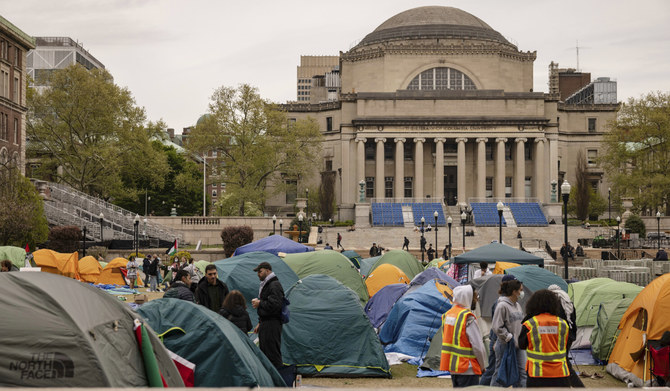
- The gala dinner and a surrounding series of society events are taking place as the Gaza protest movement has been spreading to colleges across the country, and as police crackdowns on some campuses have led to hundreds of arrests
WASHINGTON: The White House Correspondents’ Association dinner, which annually brings reporters, politicians and a glitzy array of celebrities together in a mostly lighthearted affair, will take place Saturday under very different circumstances, including a call for a boycott by Palestinian journalists.
With President Joe Biden heading a long list of VIP guests, more than two dozen Palestinian journalists this week issued an open letter urging their American colleagues to boycott the dinner.
“You have a unique responsibility to speak truth to power and uphold journalistic integrity,” said the letter. “It is unacceptable to stay silent out of fear or professional concern while journalists in Gaza continue to be detained, tortured, and killed for doing our jobs.”
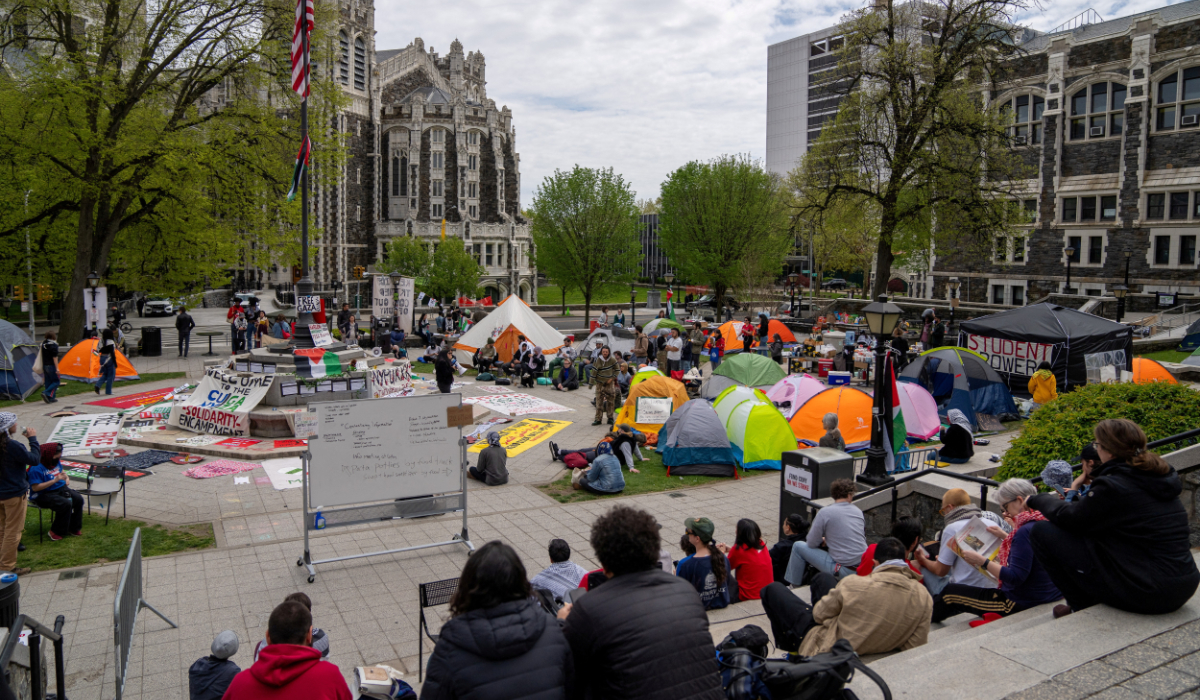
According to the New York-based Committee for the Protection of Journalists (CPJ), at least 97 journalists — including 92 Palestinians — have been killed since war erupted on October 7 with Hamas’s invasion of southern Israel. At least 16 others have been wounded.
In addition to the boycott call, an anti-war coalition is planning a demonstration not far from the Washington Hilton hotel where the dinner is to take place.
The anti-war group Code Pink, part of the coalition, said it planned to “shut down” the dinner to protest “the complicity of the Biden administration in the targeting and killing of Palestinian journalists by the Israeli military.”

It said its action would be “nonviolent” but offered no details.
For months, Biden’s every move has been shadowed by protesters angry over US support for the Israeli military offensive in Gaza. He has been met by shouts of “Genocide Joe” and noisy calls for an immediate ceasefire in Gaza.
The gala dinner and a surrounding series of society events are taking place as the Gaza protest movement has been spreading to colleges across the country, and as police crackdowns on some campuses have led to hundreds of arrests.
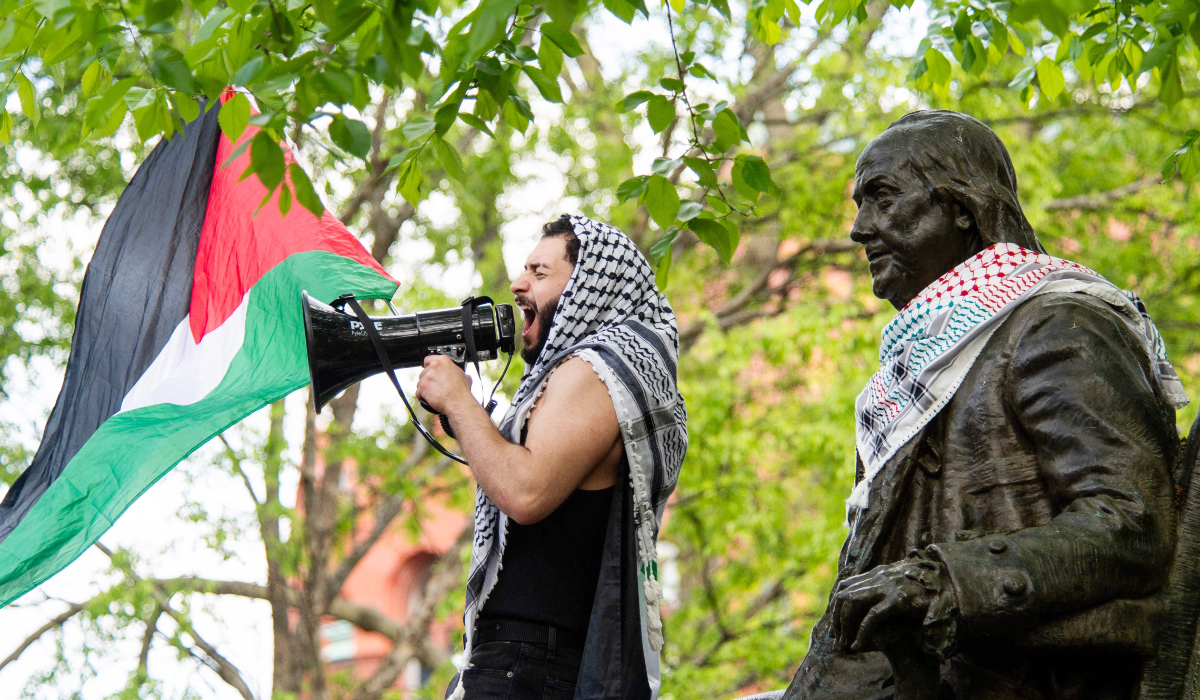
At the dinner, in keeping with longstanding tradition — interrupted during the Donald Trump years — Biden will sit on the dais keeping a steady smile on his face as a guest comedian rips into him.
This year it will be Colin Jost, a longtime writer and actor with NBC’s “Saturday Night Live,” who seeks to entertain the crowd of VIPs in their tuxedos and flowing evening gowns. (Jost’s wife, actress Scarlett Johansson, is expected to be there.)
The 81-year-old US president, also in keeping with tradition, will then deliver a speech, sure to include some self-mockery, some ribbing of the press and, no doubt, some sharp-elbowed jabs at Trump, his presumptive opponent in November’s presidential election.
The annual dinner has been organized since 1920 by the influential White House Correspondents’ Association, which honors top reporters and awards journalism scholarships.
Last year, 2,600 people attended.
The association declined an AFP request to comment on the boycott call and the planned demonstration.
US troops to leave Chad in second African state withdrawal
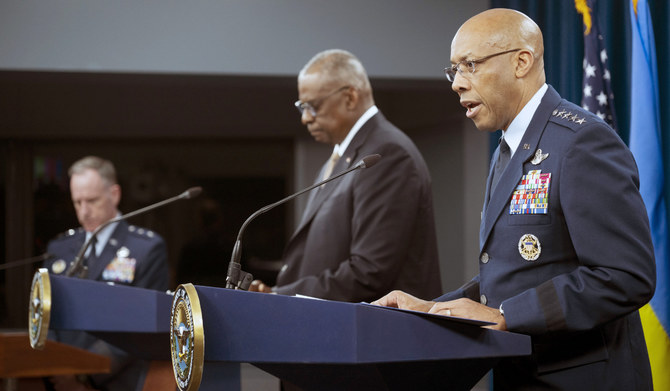
- It is important to stress that this withdrawal in no way signifies a break in cooperation between the two countries in the fight against terrorism
WASHINGTON: The US will withdraw some troops from Chad, the Pentagon has said, days after Washington agreed to move forces out of neighboring Niger.
The US has approximately 100 troops stationed in Chad as part of its strategy to combat extremism in West Africa.
“USAFRICOM is currently planning to reposition some US military forces from Chad, a portion of which were already scheduled to depart,” Pentagon press secretary Maj. Gen. Pat Ryder told a news conference, referring to the US Africa Command.
“This is a temporary step as part of an ongoing review of our security cooperation, which will resume after Chad’s May 6 presidential election.”
The withdrawal of about 75 US Army Special Forces personnel is scheduled to begin this weekend and be completed within days unless there are last-minute diplomatic developments, the New York Times reported, citing US officials.
Chad’s air force chief had ordered the US military this month to halt activities at an air base near the capital N’Djamena, according to a letter sent to the transitional government.
He said he had asked the US military to provide documents “justifying its presence at the Adji Kossei Air Base” but had not received any.
US troops at the Adji Kossei military base train anti-terrorism special forces and an elite unit of the Chadian army to combat the Nigerian jihadist group Boko Haram.
“The presence of American forces in Chad was initially motivated by a common commitment to the fight against terrorism, an objective shared between the two nations,” a Chadian government spokesperson said.
“However, the Chadian general staff has expressed concerns about this presence,” said Abderaman Koulamallah. In recognition of the concerns expressed, the US government has decided to temporarily withdraw its forces from Chad.
“It is important to stress that this withdrawal does not in any way signal a break in cooperation between the two countries in the fight against terrorism.
“Further discussions will take place to explore the possibility of the return of US forces in the case of a specific bilateral agreement between the two nations.”
Neighboring Niger is also a linchpin in the US and French strategy to combat jihadists in the region.
But Niger’s ruling military junta said in March that it was ending a military cooperation agreement with Washington, claiming it had been imposed and the US troop presence was illegal.
Washington this week began discussions with Niger on withdrawing the more than 1,000 US personnel in the country, which is also home to a $100-million American drone base.
The US will “continue to explore options on how we can ensure that we’re able to continue to address potential terrorist threats” in the wake of the withdrawal, Ryder said this week following the announcement of the US pull-out from Niger.
General Mahamat Idriss Deby Itno seized the presidency of Chad in a 2021 coup after the death of his father, Idriss Deby Itno, who had ruled the Sahel country with an iron fist for more than three decades.
He announced in March his candidacy in the upcoming presidential election that has seen opposition candidates banned from running, and his main rival Yaya Dillo Djerou shot dead in an army assault on his party headquarters.





